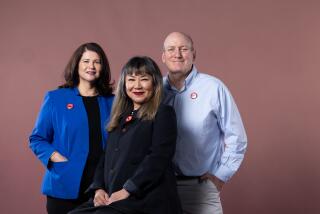Unions target owners of five L.A. carwashes
- Share via
An aggressive push to organize thousands of immigrant carwash workers in Southern California has sparked a fierce battle pitting big labor against two brothers who are major players in the Los Angeles carwash industry.
The labor movement has emptied its arsenal against Benny and Nisan Pirian, entrepreneurs whose family operates five carwashes in Los Angeles County. The Pirians settled a federal labor complaint last month but still face criminal charges, a class-action suit, a union boycott and recurrent demonstrations.
The carwash dispute is being closely watched nationwide as one of the latest fronts in organized labor’s push to bolster its immigrant ranks. The sponsorship of the AFL-CIO and the United Steelworkers underscores how such campaigns have gained mainstream footing after successful efforts to organize janitors, drywall workers and others.
“It shows that the plight of low-wage immigrant workers is now very much on the radar of organized labor,” said Ruth Milkman, a labor expert at UCLA.
This month, union backers took the unusual step of holding a candlelight vigil outside Benny Pirian’s Beverly Hills home, inviting a rabbi to join the speakers in excoriating the brothers’ alleged mistreatment of workers.
“We are just looking for respect, to be treated as human beings,” said Pedro Guzman, a worker at the Vermont Hand Wash, the family flagship, who was among the participants.
The Pirians declined to comment through their attorney, Mark J. Werksman, who described the siblings as Iranian immigrants who are model employers facing a union smear campaign. He said there was no advantage to workers having a union in a small, family-run business.
“The union is using my clients as a punching bag to try and flex their muscles and intimidate the carwash industry in Los Angeles to accept unionization,” he said.
The unions are pushing carwash owners to sign so-called clean accords, in which employers agree to uphold minimum wage, safety and environmental laws, while also pledging to respect workers’ right to organize. No employer has signed a clean agreement to date.
“We’re trying to raise the standards of the industry and at least get everyone to earn minimum wage before we move to the next phase, collective bargaining,” said Chloe Osmer, strategic coordinator for the carwash campaign, which went public 18 months ago.
Pro-union workers say they have faced dismissals, slashed hours and other reprisals.
Last month, organizers and Pirian-owned Vermont Hand Wash settled a complaint filed with the National Labor Relations Board. Among other things, the company agreed to pay back wages of more than $50,000 to four employees who say they were terminated or had their hours cut because of union sympathies.
“Some of my colleagues got fed up and left,” said Guzman, a native of Honduras who was awarded $1,650 in back pay. “But I’m sticking it out.”
Despite such friction, activists say the union offensive has already prompted some carwash owners, including the Pirians, to pay more attention to minimum wage laws and belatedly provide safety equipment, such as gloves and masks.
The carwash industry, which employs about 18,000 workers in Southern California, according to union estimates, has long been accused of violating wage guidelines and worker protection laws. Carwash workers say they face hazards from airborne fumes and possible skin damage from solvents, soap and acid.
A state law passed in 2004 created employee safeguards and mandated that carwash owners register their operations. But authorities cite continued offenses, including failure to pay minimum wage and overtime, lack of safety equipment and threats directed at workers.
“Carwashes are sweatshops out in public,” said Julia Figueira-McDonough, a deputy Los Angeles city attorney prosecuting criminal charges against the Pirian brothers.
The Pirians were in court last week, fighting off 220 misdemeanor counts in the city case, which cites alleged abuses against workers. Charges include wage theft, intimidating witnesses and conspiracy.
The Pirian brothers, who are free on bail, could each face more than 120 years’ imprisonment and fines of $186,000 if convicted. The brothers could also be forced to pay more than $1.2 million in restitution to workers.
The charges, said Werksman, the Pirians’ attorney, are “bogus and trivial,” part of a “witch hunt” designed to pressure the industry to bow to unionization.
“I think the union was very intimately involved in the filing of these charges,” he said.
Although acknowledging that the union helped facilitate the testimony of dozens of witnesses, city officials denied that the case stemmed from union pressure.
“We make our own independent decisions based on the claims alleged,” said Andrew K. Wong, deputy Los Angeles city attorney. “We don’t ask the union its opinion.”
--
More to Read
Sign up for Essential California
The most important California stories and recommendations in your inbox every morning.
You may occasionally receive promotional content from the Los Angeles Times.










